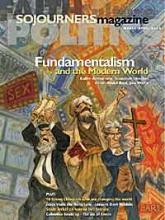Sounds like a great Old Testament saga, doesn't it?the sin of Enron. Well, this may be a more biblical tale than we think. Before going to church a few weekends ago, I heard Treasury Secretary Paul O'Neill on Fox News Sunday. "Part of the genius of capitalism," he said, is that "people get to make good decisions or bad decisions. And they get to pay the consequences or to enjoy the fruits of their decisions." O'Neill was doing the Sunday morning news circuit to talk about Enron, the huge energy company that just went bankrupt, destroying both the jobs and life savings of thousands of Enron employees, yet enriching the corporation's top executives.
O'Neill got it wrong. In fact, the emerging Enron scandal teaches a different lesson than O'Neill'sthe people on the top of the American economy get rich no matter whether they make good or bad decisions, while workers and consumers are the ones who suffer from all the bad ones. In the Enron case, the company executives overestimated the company value, ran it into the ground, lied to their employees about the company's stability, encouraged Enron's workers to invest their pension funds in company stock and then imposed rules against selling that stock while, at the same time, arranging an executive bailout for themselves worth a fortune. Shortly before the collapse, Enron CEO Ken Lay quietly sold his company stock for $101 million. Timing is everything.
Read the Full Article
